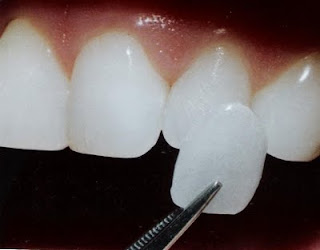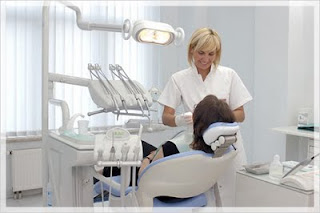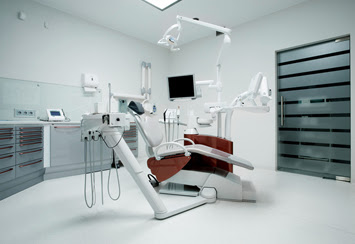Check rental: suitcase packed, the house insured, insurance documents and ID cards updated. In principle, everything should be under control, even a person to water your flowers is ready. Phone calls to travel agencies, the insurer and the doctor carefully recorded in the notebook and mobile phone (just in case.) Now just an old Polish custom, sit for a while before the trip and basically you go. Is it really like this?
vacation planning often begins shortly after returning from the previous one. In the end, it is the most awaited time of the year, the driving force to find in yourself enough energy to work for the next month. We think about many things - we organize a trip to the minutest detail, we are preparing, for example, the beauty salon, hairdresser, complete deficiencies in the medicine cabinet. Unfortunately, the schedule of preparations very rarely includes a visit to the dentist. A severe toothache can change the dream vacation into a nightmare.
"Indeed, a toothache during the holidays, especially abroad, can be a real chore. However, it is not like it comes unexpectedly. If we neglect dental checks, a surprise can happen. And sometimes we are in a place, where it is difficult to count on finding the right dentist. Once, a patient with pain, who staying on holiday in Tibet, called our cener. We tried to help her find the right office, but the sanitary conditions of those who managed to locate, left much to be desired. Finally we consulted with her the content of her first aid kit, and somehow she managed to survive for another week. But when she came to our center from the airport, she was not talking about an exotic vacation in a faraway country, but about a horrible pain, which destroyed most of her travel plans. "- says the owner of one of Poznan dentistry centers.
To avoid such an adventure, you should regularly check your mouth at the dentist. Even the treatment of serious dental problems can be scheduled so that there are no unpleasant surprises during holidays. "In fact, oral health is affected by such things as diet, daily hygiene, regular visits to the doctor and hygienisation tooth so the removal of stone and sediment. If we take care of all these, the risk of holiday surprises drops to almost zero. "- explains the owner of the clinic. What is important to protect yourself against unexpected toothache does not immediately mean curing all the ailments, but of course such a situation would be the best solution. Sometimes simply prudence is enough.
Last minute visits
Inspection of the oral cavity before departure is not only the best recipe for ensuring a peaceful atmosphere, but also a way to avoid many problems: the need to find a doctor in the place where we are staying, and unforeseen costs that may exceed those that we normally pay. We do not have a guarantee of the quality of the treatment - such a rescue is unfortunately bound up with unpleasant consequences. For example, if a doctor we go to with our pain, does not have suitable equipment, sometimes just needs to remove the painful tooth, while our dentist could save it. So better safe than sorry and make an appointment for preventive inspection visit at least several weeks before your holiday.
Some people claim that one reason for bad vacations is bad weather. But even the most beautiful weather seems to be a nightmare when combined with a toothache. So let's make sure before you go on holiday, that you have a cheerful, healthy smile.
Monday, 30 May 2011
Cautious people rest better
Labels:
Dental Health,
Dental Tourism,
Medical Tourism
Monday, 23 May 2011
Better teeth, better sex
Lack of proper oral hygiene and cavities are ruining sex life. Research shows that as much as 37.5 percent of people avoid sex with a partner due to bad breath. As many as 72.5 percent do not allow to be kissed by people with so-called 'dragon's breath'. For hygiene, however, that's not the end of problems. Headache, during sex may have its cause not in migraine but in bad teeth condition.
Minty breath is sexy!
Poor oral hygiene and teeth losses influence our heart, facial skin firmness, proper bowel function, and ... sex. Halitosis cools romantic aspirations in more than 70 percent of people. More than 30 percent declared that in the past they abandoned a lover because of bad breath. 9 out of 10 respondents confessed about it directly to the partner. But not only the smell from the mouth distracts us from the bed. Also, the appearance of teeth. According to the U.S. website artofseductions.com perfect smile is one of the 100 most important things that women consider atractive in a guy. A smile is still on a high 13 position, just behind the height, beautiful eyes, self-confidence and wealth. Ahead of such items as the perfect silhouette (24th place) and a natural way of being (100 place).
- Healthy teeth and proper oral hygiene makes us more attractive. Symmetrical teeth and perfectly "framed" mouth makes our attention focused on a smile during a conversation or a date. It encourages people to contact us. People with perfect teeth are considered more involving, open and friendly, and even richer. It is also important to take care of your breath on a date. Unpleasant odors can be associated with diseases, and they always discourage partners, "said Dr. Mariusz Duda, MD, from the Department of Implantology and Esthetic Dentistry Clinic Duda.
And he adds: - Attractive smile undermines both the individual losses as well as stains from coffee and cigarettes, visible fillings, broken teeth or teeth which with age are becoming shorter and disappear under our lip line. Then, the face loses its elasticity, look older - he says.
Headache in bed? Go to the dentist
But the quality of our smile affects not only how we are perceived by partners. Problems with teeth can also cause severe headaches, which cool ardor in the bedroom. - Causes of headaches, which many women and men feel before or during sex, may have its source in a sick tooth. So if, despite taking the tablets for a headache or migraine, the pain persists, you may want to go to the dentist, he may prove to be a cure on the bed problems - says polish dentist.
So how do you increase your sexual attractiveness with the help of a dentist? - Firstly, brush your teeth, use floss and mouth liquids. If we have discolored teeth, we can whiten them. Today's methods available in the offices give the effect as early as after 45 minutes. Such a solution can be arranged even before a date. Losses should be complemented by individual dental implants or fillings, which are the same the color as the other teeth. Gaps between teeth can also be closed by the composite. - says Duda.
But for those who want to opt for a radical change in the smile there is good news. Braces are sexy! Sexologists of the Silesian University have proven that people wearing braces are not only more appealing - the braces is a good lure, and the people wearing them are also more creative in bed.
Labels:
Dental Health,
General Health
Thursday, 19 May 2011
Bruxism. How does stress influence our dental condition?
Stress is the body's biological state of tension, triggered by various somatic and / or psychological stimuli known as stressors. As a result of stressors the body starts the complex adaptive responses. Stress can have positive effects on the body if it lasts for short period of time, for example, the reflex of keeping distance caused by sudden roar. A long-term stress has usually a destructive nature. Stress not only causes psychological symptoms, but symptoms from the locomotor, cardiovascular, endocrine, immune, sympathetic and parasympathetic systems.
Organism acts out stressful situations by using the motor response. A chewing organ, which was overloaded by strong stimuli that caused stress, tries to relieve the situation by making aimless motor activity - parafunctions. Parafunctions can be divided into two groups: mutual contact of the teeth, such as clenching and grinding, or parafunctions, which are habits and take place without the mutual contact of the teeth, such as biting your nail and skin around the nails, chewing gum, biting items such as pencils, pens, etc., biting lips . It is believed that parafunctions are responsible for diseases of the mouth in 40-50% of children and 60-80% of teenagers and adults.
Parafunctions cause the occurrence of the following groups of symptoms:
1. Intraoral symptoms:
a) located in the teeth and / or periodontium:
• enamel dysplasia, enamel cracks, wedge cavities
• teeth movement
• fracture of teeth with vital pulp
• symptoms similar to inflammatory pulp
• radiation of pain as a result of overloading of teeth
• strong rubbing off of teeth (pathological)
• teeth crimping and / or grinding
b) located outside the dental arches and the periodontium:
• traces of applying any pressure cheek mucosa and / or lips
• pressure marks of teeth on the tongue
• aphthae
• feeling of an obstacle presence
• pain during swallowing
• speaking with clenched teeth
• metallic taste in mouth
• disorders of saliva production
• soft tissue tumors
c) located on the dental-alveolar pond:
• loosening of individual teeth
• loosening of teeth groups
• tooth movement
2. Symptoms within the temporomandibular joint:
• abnormal condylar motion
• pathological sounds such as cracks, crackle
• painful temporomandibular joint with pressure
• deviation of the mandible at the time of its abduction and / or adduction
• deviation of the exiting
• diverse range of lateral mandibular movements
• hypermobility of the mandible
• reduction of jaw movements
Patients with dysfunctions of the stomatognathic system inducing mental state can be classified into three groups:
Group I:
Dysfunctions are caused by the primary factors (barriers to normal relations of teeth), which triggers a reflex increase in muscle tension in order to remove obstacles through attrition, which usually leads to severe clashes, shift bumps and grooves in different places than they occur in naturally, may be also interfering tooth movement resulting in the formation of individual occlusions. Disturbances in the occlusion and the accompanying stress lead to bruxism.
Group II:
Long-term presence of stress factors triggers strong psychological tension which leads to excessive muscle tension. Tension is unloaded in the dental arches by the action of movement. Excessive chewing muscle activity leads to a characteristic of taurus clash.
Group III:
Mental illnesses and disabilities, often hidden depression, may lead to disorders of chewing system. Patients with mental illnesses often focus on the dental arches and the bite, which they consider to be the main source of their ailments. Even a slight dental treatment can induce such persons to occlusal neurosis, which is revealed by increased masticatory muscle tension, there is also grinding and clenching of teeth. Mental illnesses are contraindications for occlusal therapy. Moreover, in this group occurs a frequent presence of periodontal disease and poorer hygiene than in those without mental disorders.
Bruxism
Bruxism is a kind of parafunctions, which consists of an unconscious grinding and tightening of teeth, which leads to the disturbing activities of the stomatognathic system. There are two types of bruxism - centric-occurring normally during the day which consists of a strong tightening of teeth in centric occlusion and eccentric bruxism which appears usually at night during sleep - its main symptoms are involuntary teeth grinding.
Bruxism occurs as a result of prolonged stress, central nervous system disorders, habitual gum chewing for several hours or unilateral chewing. Other causes of this condition are irregularities in the dealings of own teeth or poorly treated teeth with wrongly modelled fillings and surface of crowns, bridges or dentures as well as missing teeth.
Treatment of bruxism consists in identifying and eliminating its cause.
Labels:
Dental Health,
General Health
Thursday, 12 May 2011
Cosmetic dentistry - Veneers
Veneers are mademainly to improve the esthetics of the teeth, from the prosthetic point of view, they are partial lip crowns. Veneers are usually madefrom porcelain. There are also veneers madeof plastic, but they do not provide such a good cosmetic effect.
Materials currently used to perform veneers are porcelain, zircon, acrylics, composites. Ceramic veneers are virtually indistinguishable from natural teeth, in addition to having excellent the smoothest surface of all the materials used in prosthetics, which hinders the adhesion of bacteria and the production of dental plaque. Zirconium is considered the most biocompatible material used in prosthetic dentistry.
Veneers are desirable mostly in the following cases:
• correction of the shape of teeth
• occurrence of stubborn stains, such as after treatment with tetracyclines, root canal treatment or after fluorozach
• incisal fracture due to injury
• fracture of permanent teeth at an early age
• closing stems (gaps between teeth), especially aesthetics
• dental hypoplasia (dysplasia)
• extensive damage to the enamel by erosion / mechanical injury
• presence of large cervical restorations
Contraindications against veneers:
• parafunctions of chewing, such as teeth grinding, habitual clenching of teeth
• too large fillings
• prone to tooth decay or the presence of active caries
• too short teeth
• oral hygiene not sufficient enough
Diagnosis and Treatment Plan
Prior to the veneers, the dentist needs to perform a dental consultation and x-rays to exclude the presence of caries. It is advisable to treat caries and remove the tartar, if they are present. It is preferred to take photos before treatment and after its completion, in order to avoid any possible misunderstandings, in addition to objectively assess the treatment effect.
Preparation of the tooth and its cementing
Preparation of the tooth needs an anesthesia performed on the patient and retraction of the gums. The next step is to collect tissue from the labial surface of the crown - typically grinding is carried out exclusively in the enamel. The tooth surfaces is prepared taking into account the material from which the veneer will be made.
During the entire procedure water is used for cooling, which prevents overheating of the tooth, especially the pulp. After preparing the impressions of silicone are taken, which allow for very accurate representation of the surface. The polished tooth is secured by a temporary supplement which prevents the formation of hypersensitivity.
The impression is sent to a laboratory where a plaster model is made and on its basis the veneer is prepared. The dentist's office assesses the supplement and makes changes if neccessary. Then the veneer is cemented to the previously prepared tooth. A well-made veneer is virtually impossible to distinguish from a natural tooth.
Labels:
Methods of Dental Treatment,
Veneers
Monday, 2 May 2011
Dental services market in Europe
Growing awareness of health prevention and constantly improving economic conditions contribute to increased interest in Central and Eastern Europe. Over the years we can observe a significant increase in the number of dentists and dental companies, which is a result of ever-increasing demand for these services, the level of which in Poland is just one of the highest in Europe.
For the dental sector (dentists and dental technicians) the enlargement of the European Union brings many new challenges - in fact only benefits. Within the framework of the Lisbon strategy implemented by the EU - the aim is the dynamic growth in employment, the key task is to open the currently split domestic markets in the EU, so that a fully functional EU services market was comparable to national markets.
For the patients it means:
1. additional capabilities - flexibility and the choice of treatment
As a result, the European Court of Justice ruling in 1998 for dental treatment, patients have the possibility of treatment in any EU country and they receive reimbursement of its expenditure from domestic insurers.This solution is generally beneficial for patients because it allows their mobility, and rising expectations of patients will encourage dentists to continuously increase their skills, raise the quality of dental services, increase awareness of preventive dental care, develop fine and comfortable form of treatment involving not only to repair damage caused but also to ensure that patients keep their teeth for as long as possible, with an attractive appearance and well-being.
2. Polish dentists in demand- both in Poland and abroad.
Dental services market in Poland before 2005 was heavily saturated, year by year, the number of graduates of dental departments increased. Famous for training a large number of dentists, the Medical University of Lublin, every year, ended with a very large number of dentists - several times actually surpassing the market demand for dental services. For those young and inexperienced doctors in the early stages of their career it was very difficult to operate in the Polish conditions. Most young dentists from Lublin, Bialystok, Kielce, Lodz, therefore emigrated to Warsaw. In the capital, the competition was and is a huge demand for dental services, however, much higher than in other cities. This was influenced by higher earnings primarily from Warsaw. After the entry of 10 new countries to the European Union, due to the massive 'dental visits of the English, Danes and Germans, the situation changed dramatically - the interest in dental services in major cities has increased.
Fortunately, after Polish accession to the EU, young Poles are free to find work outside Poland, and this alternative is used by more and more dentists not only the Polish ones, but also from other countries in Central and Eastern Europe. The prospects for the Polish dentists are very optimistic, because of the Europe's free market, low prices of Polish services (in comparison with the countries of Western Europe) and very high quality of these services.
3.Freedom of dentists in the provision of services and setting up offices wherever they wish.
The European market opens for dentists.
Members of the German dental industry - dentists, dental technicians and producers - are well prepared to act on the European market. Highly qualified, flexible and innovative, they can count on high potential European market, whose population is now 453 million. Their problem is only the high cost of treatment in the German offices. It is the great superiority of the Central European countries - mainly Poland.
4. Foreign "tourists" visiting dental offices.
According to data from the Polish Information and Foreign Investment Agency in 2005, visitors from abroad spent on treatment in Poland more than 200 million PLN. Experts estimate that this sector over the next few years will increase by as much as 25-30% annually. Mostly, for health tourism, Poland is visited by the Germans, Brits, Danes, Canadians. Englishmen are attracted mainly by the possibility to make use of dental services, several times cheaper in Poland than in Britain. Similarly, Danes and Swedes. There is no shortage of the Germans as well- they're going to Poland particularly for treatments and operations. Their Mecca is Szczecin, where nearly 800 dental offices can be found.Their owners often work with travel agencies that acquire their customers, they often organize promotional campaigns and hire coaches, which carry patients across the border. Guests also enjoy spa treatment rooms, beauty salon, hairdressers. One customer leaves sometimes even a few thousand euros in Polish doctors' offices, including nearly half of the dentists .. International customers are becoming more involved in Central European dental market. In Poland they often spend even two weeks, passing comprehensive treatment. Most of them are the British, who have a problem with their own health care system. Because of the fact that they choose Poland, the Czech Republic or Hungary, they save from a few to several thousand pounds. The owners of offices in these countries invest tens of millions of zloty to meet the demands of the customers. It is worth fighting for.
These countries, especially Poland, offer:
• very high standard of dental services,
• modern equipment,
• high quality of treatments,
• attractive prices
• a professional medical staff.
Labels:
Dental Tourism,
Dentistry in Poland,
Medical Tourism
Subscribe to:
Comments (Atom)








